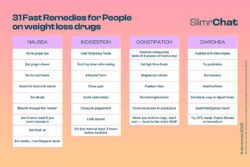Why some people experience weight loss drug side effects and others don’t
Anna-Louise Dearden | Last update: 27th September 2025
Most people who take GLP-1 weight loss drugs like Mounjaro or Wegovy experience at least one side effect, especially in the early stages. For some, the symptoms are mild and short-lived. For others, they’re persistent, unpredictable, or strong enough to make them stop treatment altogether.
This article explores why that happens, why some people breeze through treatment while others struggle, and what factors influence who gets what side effects. It’s not about how to manage side effects (you can find that here and here). Instead, this article is about what causes side effects in the first place, and why they’re not the same for everyone

What causes GLP-1 drug side effects?
GLP-1 medications mimic natural hormones that help regulate appetite and digestion. They primarily work by slowing stomach emptying and reducing appetite, which is great for weight loss, but can also lead to uncomfortable digestive symptoms like:
- Nausea
- Vomiting
- Bloating
- Constipation
- Acid reflux
These effects happen because the very mechanism that makes you feel fuller – a slower, calmer gut – also disrupts your normal digestion. Here’s a quick guide to some tips to mange these common side effects:

Other side effects, like mood changes or decreased interest in food, are believed to be linked to the drug’s impact on the gut-brain axis, the connection between your digestive system and your brain’s reward system.
In rare cases, people experience:
- Anhedonia (loss of interest in previously enjoyable things)
- Low mood or irritability
- A drop in libido or energy
The MHRA (UK regulator) has found no evidence that GLP-1s cause depression or suicidal thoughts, but it continues to monitor their psychological impact.
Why do some people get side effects and others don’t?
Here’s what science (and patient experience) suggests:
1. Everyone’s biology is different
GLP-1 drugs act on the gut-brain axis, a system shaped by your genetics, hormones, microbiome, and brain chemistry. That’s why one person might feel nauseous on day one, while another sails through week after week.
- Hormonal variation: Hormones like oestrogen and progesterone influence how your body responds. This is why menopausal women may be more sensitive to side effects.
- Gut health: Your microbiome, that is the bacteria in your gut, also affects how your body handles slowed digestion.
- Genetic differences: Certain genes influence appetite regulation, fat storage, and metabolism. These can affect how “strong” the drug feels.
‘One size doesn’t fit all’ is especially true for GLP-1s.
2. Dose matters and so does timing
GLP-1 drugs are prescribed with a carefully managed dose escalation plan. This is because:
- Higher doses cause stronger appetite suppression, but also higher risk of nausea and GI issues
- Your body needs time to adapt to the slower digestion and hormonal changes
If you increase too quickly – or miss multiple doses and restart at the last dose – your body is more likely to react badly.
The goal isn’t to get to the highest dose quickly. It’s to get to the right dose safely.
Read more: Why GLP-1 doses increase gradually
3. Drug differences: Single vs dual action
- Semaglutide (Wegovy, Ozempic) targets the GLP-1 receptor only.
- Tirzepatide (Mounjaro) acts on both GLP-1 and GIP receptors – which some find more effective, but also more intense.
Some people do better on single-action medications, especially if they’re sensitive to side effects. Others find dual-action drugs work faster with fewer cravings.
Everyone responds differently. What works for one body might not work for another.
4. Underlying medical conditions
Certain conditions can make side effects worse, or more likely:
- IBS or chronic digestive issues can amplify bloating, constipation, or nausea
- Thyroid issues, diabetes, or insulin resistance affect how your body processes the medication
- Perimenopause or menopause may heighten hormonal sensitivity
It’s important to speak to your doctor before starting, and especially if side effects are intense or don’t ease over time.
More info: BHF on who should avoid GLP-1 meds
5. Fake drugs = unknown side effects
Side effects from counterfeit or unregulated drugs can be dangerous and unpredictable. They may contain incorrect doses, different substances, or no active ingredients at all.
- Only get your prescription from a trusted UK pharmacy
- Be wary of TikTok ‘miracle shots’ or social media sellers
- If the price looks too good to be true – it probably is
Read more: Gov.uk: Risks of fake GLP-1 medicines
Do side effects affect whether people stick with it?
Yes, and not just the physical symptoms. Side effects can deeply impact how people feel about themselves, their treatment, and their motivation to continue.
Physical reasons people stop:
- Persistent nausea, bloating or tiredness
- Discomfort from dose increases
- Appetite too suppressed – they forget to eat or feel weak
Psychological reasons:
- Feeling ‘not like myself’ or emotionally flat
- Loss of joy from food and social eating
- Stigma or judgement from others
- Fear of weight regain if they stop
However, for many people, the benefits far outweigh the negatives:
- They feel healthier, lighter, more energetic
- They enjoy exercise, dating, travel again
- They feel more anonymous and less judged in public
Read more: BBC – Why some stop taking weight loss drugs
Final word from SlimrChat
Most side effects from weight loss injections are mild and temporary, especially when the dose is managed properly.
Some people never get them. Others do, and find them manageable with time and good habits. And some people simply find the side effects too much.
It all comes down to your body, your biology, your response.
The best advice? Start low, go slow, and stay informed.
If you’re struggling with symptoms, read our guides:
And as always: talk to your doctor or healthcare provider before changing your dose or stopping treatment.